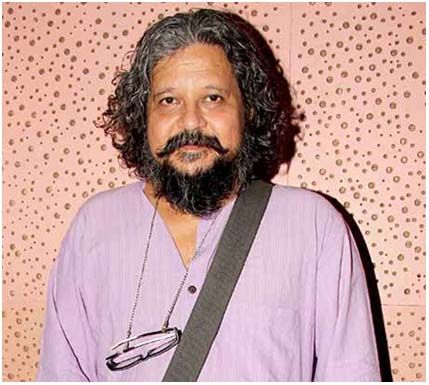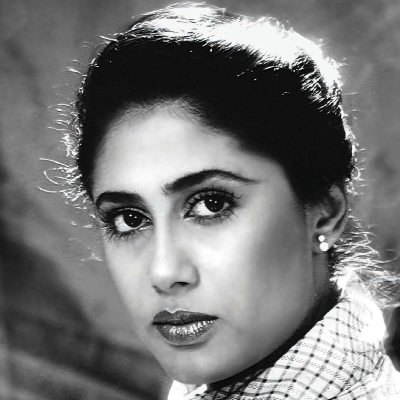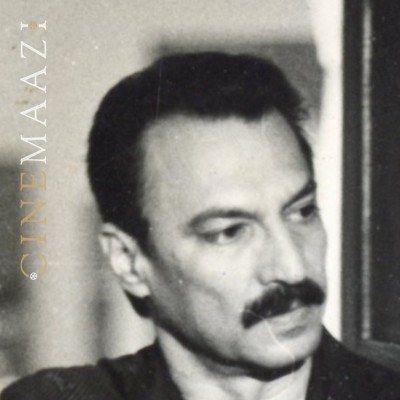Amole Gupte

Subscribe to read full article
This section is for paid subscribers only. Our subscription is only $37/- for one full year.
You get unlimited access to all paid section and features on the website with this subscription.
Not ready for a full subscription?
You can access this article for $2 , and have it saved to your account for one year.
- Born: 1962 (..)
- Primary Cinema: Hindi
- Spouse: Deepa Bhatia
- Children: Partho A Gupte
Amole Gupte is well known for—but not limited to—his children-centric work in cinema as a screenwriter, actor and director. While he is probably best known for Taare Zameen Par (2007), which changed the common man’s perception of education, teaching and even parenting, his insightful and impactful directorials include Stanley Ka Dabba (2011), Hawaa Hawaai (2014), Sniff (2017), and Saina (2021). He has consistently worked with children in reel and real life, and has unarguably brought more visibility to children’s cinema in India through his work. Primarily known as a director, he has also made an impact with his acting performances onscreen in Kaminey (2009), Phas Gaye Re Obama (2010), Urumi: The Warriors Who Wanted To Kill Vasco Da Gama (2011), Bheja Fry 2 (2011), Singham Returns (2014), and Mumbai Saga (2021). He has also worked in the music department of Taare Zameen Par, Stanley Ka Dabba and Hawaa Hawaai, and has produced Stanley Ka Dabba, Hawaa Hawaai, and Sniff (2017). He was the chairperson of the Children's Film Society, India from 2012 to 2015, and serves as a member of the advisory board of the Kautik International Student Film Festival.
The 1962-born Gupte, an avid lover of cinema, has been influenced by a wide range of films from Meghe Dhaka Tara (1960) by Ritwik Ghatak, and Satyajit Ray’s Pather Panchali (1955), to Mother India (1957), Pyaasa (1957), Do Bigha Zamin (1953), and the thrillers Teesri Manzil (1966) and Jewel Thief (1967). Of the current lot of filmmakers, he admires Anurag Basu, especially his film Gangster (2006).
Gupte started his career as an actor in theatre productions and films made by students of the Film and Television Institute of India, Pune (FTII). These gigs honed his skills as a writer and he would go on to work on scripts for Kundan Shah and Saeed Mirza, among others. He took a decade-long break to paint, and then returned to TV in the mid-1990s as the host of Bol Bindaas. This hour-long talk show on Sony TV exposed him to the challenges and problems of children and teenagers, driving him to bring these issues to the big screen.
In an interview, he would maintain, “Children have always been at the receiving end of little or no support because of no voting rights. They are talked down to, commanded over. My attempt is to represent them in the mainstream.” While his films are not perfect, he is consistently able to draw out exquisite performances from his actors. The key to this evidently lies in his original approach, wherein it’s not ‘work’ but a sharing of cinema. As he succinctly pointed out, “I do not ‘extract’ performances. Extraction is for teeth.” His “chilled out” approach means there are no scripts on set and actors are allowed to improvise. As Ranjita Ganesan points out in an article in Business Standard, perhaps his most significant achievement is his re-imagination of the way child artistes should be treated. The atmosphere during the filming of his child-centric films is stress-free, akin to a hobby class. What’s more, he shoots only on weekends and holidays for three to four hours, with breaks. He believes others should adjust to the child artiste’s needs and convenience and not the other way around. He has also been instrumental in testing a new distribution model, where the Children’s Film Society of India screens chosen films in certain schools.
As a filmmaker, he came to attention with his path-breaking work for the Aamir Khan-starrer Taare Zameen Par (2007). The plot, which he conceived along with his wife Deepa Bhatia, revolved around an eight-year-old boy Ishaan (Darsheel Safary), who is thought to be a lazy trouble-maker, until the new art teacher Nikumbh (Aamir Khan) has the patience and compassion to discover the real problem behind his struggles in school. Gupte, who wrote the film, would reveal, “I spent years sitting with financially, mentally and physically differently-abled children to showcase art and make them interact with the form. Taare Zameen Par, mapped from their complaints and anguishes, is a 10-year process that I have riddled into the movie. There are about a hundred Ishaans that participated in making of Ishaan Awasthi.”
The film carried the message that each child is unique because of which all children need to be nurtured differently. Post the film, Gupte addressed 140 nations on dyslexia at a UNICEF event and his speech left the audience in tears. The film had also made waves when Aamir Khan took over the directorial reins from Gupte, who was the original director of the film, due to creative differences. Khan was credited as the director, while Gupte had to settle for writer and creative director. The film won the National film award for best film on family welfare.
Talking about the impact it created, Gupte narrated an incident when a rickshaw-wala from Lucknow called him, weeping hard on the phone while sharing his experience about how he misunderstood his child. People spoke out as someone identified with the teacher, someone with the father and someone else with Ishaan from the film. Gupte would state, “I didn’t change the system, but I succeeded in changing the people in the system.”
He would also refute the popular belief that the film was about dyslexia, saying, “It is not about an academic-learning disability. …Is there, for instance, a dyslexia for football? If so, 90 per cent would be disabled, because only 10 per cent would be able to connect to the ball. So these are misnomers as we don’t ask an Amazon patriarch dying at the grand age of 125 who has climbed trees and hunted, do you know ‘a,b,c,d?’” Gupte also maintained, “We are a challenged society if we are not thinking clearly and abusing the child by forcing to rote-learn when we ourselves don’t have 10 phone numbers in our memory system anymore.”
His directorial Stanley Ka Dabba, a comedy drama which he also wrote, continued in the school space, taking off as it did on a school-teacher, who forces children to share their food with him, and forbids one from entering the school until he brings his own tiffin/ lunch-box. It featured Gupte’s son Partho A Gupte in the lead role as Stanley. A small, non-mainstream film, it saw the profound link between human bonding and food. Attracting positive reviews from critics across India, it was called the “best, purest film to come out of Hindi cinema in a while”, “heartwarming”, and was noted for “an inherent sweetness and honesty that will stay with you long after the film is over”. Gupte’s son, actor Partho also won the richly-deserved National award for his sensitive performance in the film.
With the family sport drama Hawaa Hawaii (2014), he depicted the tale of Arjun Harishchand Waghmare (Partho A Gupte) and his dream to skate, chronicling his journey, along with his coach Aniket Bhargava (Saquib Saleem), towards becoming a champion skater.
Sniff, his adventure comedy directorial of 2017, revolved around little Sunny Gill, who belongs to a family of pickle manufacturers. However, he is a misfit as he cannot smell, but when a laboratory accident enhances his olfactory abilities, he transforms into a one-of-a-kind super hero.
His 2021 biopic Saina depicted the story of professional badminton player Saina Nehwal, who ranked number 1 in the sport. Produced by Bhushan Kumar, Krishan Kumar, Sujay Jairaj and Rashesh Shah under the banner of T-Series and Front Foot Pictures, this Parineeti Chopra-starrer traced Saina's journey from her training at Lal Bahadur Shastri Stadium, Hyderabad, including her struggles, her parents’ sacrifices for her dreams, her own passion for badminton, and her relationship with Kashyap and her coach Rajan to her becoming world no1. The film’s performance at the box office was impacted by Covid-19 but it received mixed to positive reviews from critics, being called “a simple ode to eternal optimism,” with Chopra's performance winning kudos.
Among his early films as an actor, he featured in the Ketan Mehta directorial Holi (1984), a coming of age drama starring Aamir Khan, Ashutosh Gowariker, Naseeruddin Shah, and Om Puri, among others. Gupte played a character named Amol Khanna, in the film which revolved around a violent episode in a college in a typical Indian city.
Other films he appeared in include Sudhanshu Hakku’s drama thriller Kaafila (1990) revolving around student politics in which he played a character named Ajay Thakur.
In Vishal Bhardwaj’s Shahid Kapoor-Priyanka Chopra-starrer Kaminey (2009), he stunned audiences with his portrayal of the antagonist Sunil Bhope aka Bhope Bhau, playing the older brother of Chopra’s character in the action crime drama that portrayed the desperate lives of two estranged twin brothers that converge over missing drugs, politics, racial prejudice, corrupt cops and an unplanned pregnancy. Gupte would later reveal that he was surprised at being considered for the acting part. That’s when the casting agent Honey Trehan showed him all the films he had acted in when he was at FTII, telling him they believed he was not just a filmmaker but a terrific actor, and they wanted him to work in the film. His character Bhope bhau was a typical ‘gunda’, from Maharashtra, which didn’t require much research on Gupte’s part; besides he himself knew a few characters like Bhope in real life, which helped him base the character around them. The assignment also gave him the opportunity to observe director Bhardwaj “testing himself, making ground-breaking cinema, and breaking stereotypes.”
Phas Gaye Re Obama saw him play a character named Dhananjay Singh in the comedy crime drama that starred Rajat Kapoor, and Neha Dhupia, among others.
He essayed Chirakkal Thampuran in the action drama Urumi: The Warriors Who Wanted To Kill Vasco Da Gama in 2011 that starred Prithviraj Sukumaran, Prabhu Deva, and Vidya Balan, among others. Directed by Santosh Sivan, the film depicted the tale of Chirakkal Kelu Nayanar, a warrior in 16th century Kerala, who wants to avenge his father killed in a confrontation with Vasco da Gama and his troops; he is assisted by his best friend Vavvali and warrior princess Ayesha.
Bheja Fry 2 saw him play a character called Raghu Burman alongside a cast comprising Vinay Pathak, Kay Kay Menon, and others, in the comedy drama directed by Sagar Ballary about a tax-evading businessman and an income tax officer who get stranded on an isolated island.
In the Ajay Devgn starrer Singham Returns (2014), Gupte essayed a key role of Satyaraj Chander aka Babaji, in the Rohit Shetty directorial about an honest but ferocious police officer who returns as the deputy commissioner of police, determined to wipe out injustice.
The Marathi language musical drama Ek Tara (2015) directed by Avadhoot Gupte saw him play the character of Chhota Shaukat in the story about an innocent youngster (Santosh Juvekar) with a passion for singing who wins a reality show and goes on to become famous but also struggles with fame and alcoholism.
Mumbai Saga (2021), directed by Sanjay Gupta, saw Gupte play a character named Gaitonde in the action crime film set in the era of the 1980s and 1990s which were marked as a transformational period in Mumbai. He featured alongside stars like John Abraham, and Emraan Hashmi.










.jpg)



